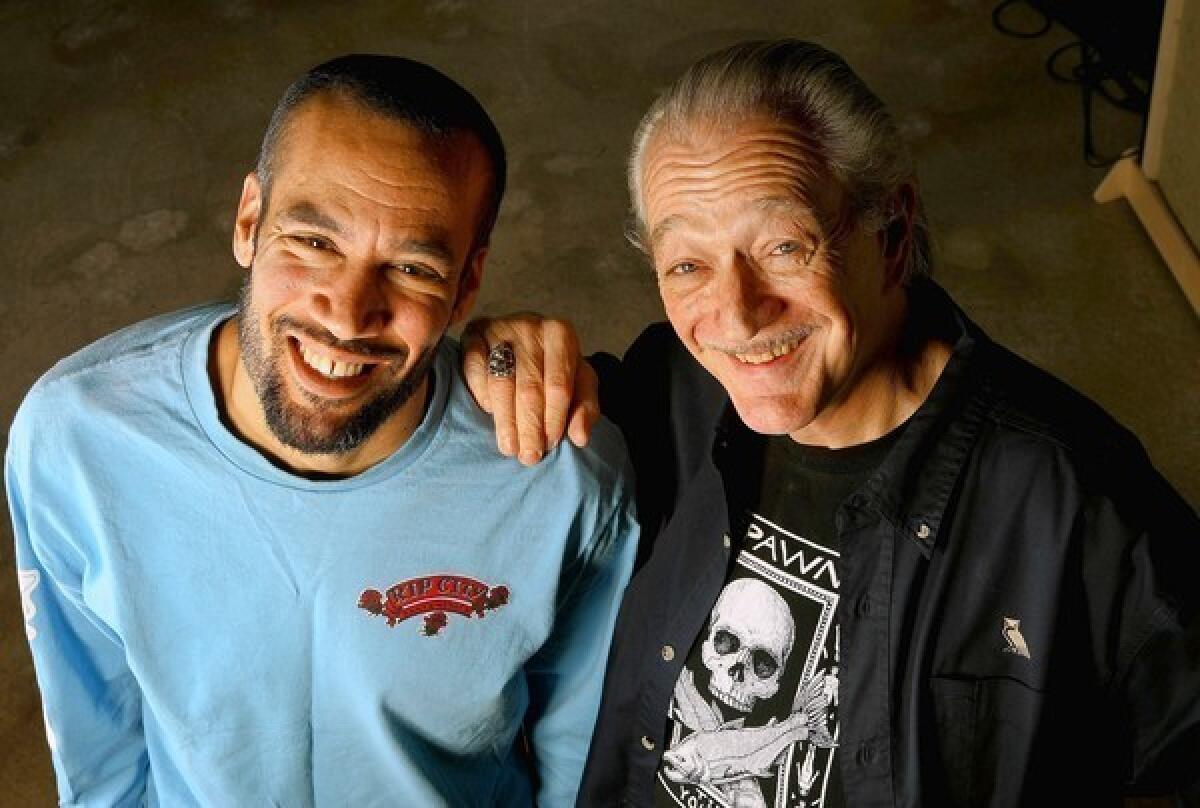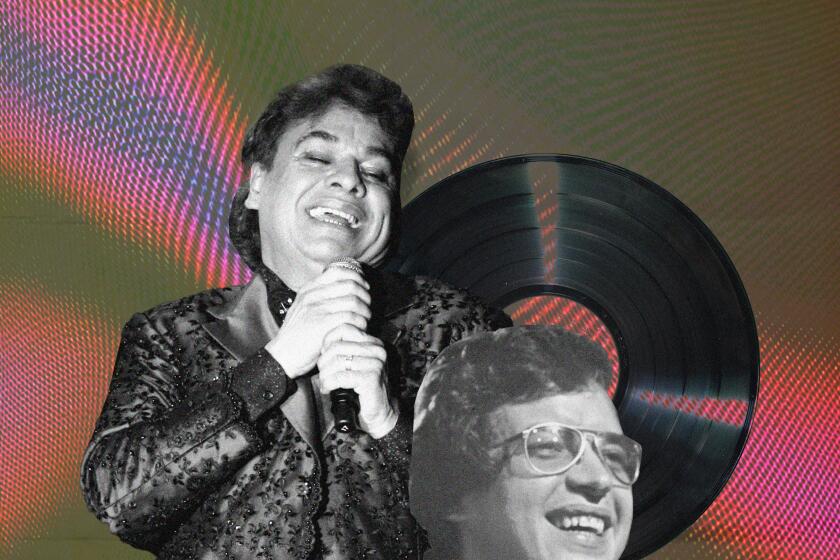Digging into their blues roots together

On a recent morning at singer-guitarist Ben Harper’s Westside studio, famed blues harmonica player Charlie Musselwhite sits with a metal briefcase filled with instruments and gear, his thin mustache and slicked-back hair an elegant gray. The room is crowded with instruments, including a baby grand piano and racks of electric and acoustic guitars. At the center is Harper’s empty chair, an array of effects pedals on the carpet.
Harper and Musselwhite just released a new album together, “Get Up!” on Stax Records. Across 10 tracks, the duo explore multiple shades of blues, including acoustic and electric, stretching from the Delta to Chicago, at times playful, raging or tortured.
Of his collaboration with Harper, Musselwhite says, “Even though he’s not playing strictly straight-ahead blues, you can feel the influence in it. His music has deep roots.”
A few minutes later Harper arrives, rolling across the concrete floor on one of the many skateboards on the premises. He’s just getting over the flu but is upbeat about the new album. An appearance on “The Tonight Show With Jay Leno” was a few days behind them, and a gig on “Jimmy Kimmel Live” on Monday was coming up. The duo also appears May 18-19 at the Doheny Blues Festival in Dana Point.
They met in 1994 at the Sweetwater Saloon up in Mill Valley, where John Lee Hooker was performing a set of heated talking blues, with frequent collaborator Musselwhite on harp. Harper was the opening act. In 1998, Hooker asked both to record a new version of his “Burnin’ Love” for a compilation album.
Hooker suggested the two keep working together. “John Lee said, ‘You got something there. You got a fish on the line,’” says Harper, 43.
Harper and Musselwhite kept in touch, crossing paths at blues fests, sitting in on each other’s sets over the years, but their plans to get into the studio never quite came together. An opening in their schedules finally arrived last year.
“Charlie said, ‘You holdin’?’” says Harper, recalling the 69-year-old Musselwhite asking about fresh material. “I said, ‘Yeah, I’m holdin’.’ He says, ‘All right, let’s go in and see if we get it.’ And the material hit the mark. It was mainly all of us sitting in a circle.”
They spent a week at the Carriage House Studios in Silver Lake, joined by Harper’s band of younger Texas players, Relentless7: guitarist Jason Mozersky, bassist Jesse Ingalls and drummer Jordan Richardson.
“They’re not guys that just started playing last week. They understand the logic of blues and how it works and the feeling of it,” Musselwhite says of the band.
The album opens with the sticky acoustic twang of “Don’t Look Twice,” then slips into a sorrowful, raging Hooker-like groan on “I’m In I’m Out and I’m Gone.” Then, amid acoustic guitar, hand claps and emotional lines from Musselwhite’s harp, comes a pained “We Can’t End This Way.”
On the song, Harper sings: “Every look of shame is a wound that will never heal / What has he done to deserve this? What have I done to deserve this? / It’s easy to remember, but it’s easier to forget.”
GRAMMYS 2013: Winners | Red carpet | Show highlights | Quotes | Best & worst dressed
Musselwhite doesn’t remember the first time he heard the blues. It was always around him as a child in Memphis, along with gospel, bluegrass and other musical traditions, years before he became a leading blues harmonica player for the likes of Hooker and Big Joe Williams.
“The street singers in downtown Memphis that were playing blues really got my attention,” recalls Musselwhite. “I could hear people singing in the fields along this creek where I lived by the woods, and that music sounded like how I felt.”
As he has done for his last several albums, Harper produced “Get Up!” himself. He won two Grammys for his 2004 collaboration with the Blind Boys of Alabama and in December he finished producing the new solo album from Natalie Maines of the Dixie Chicks.
“Get Up!” is another example of Harper being embraced by an old master — following collaborations in the past with Hooker, Solomon Burke and the Blind Boys of Alabama. Critics were slow to fully embrace him in his early days, but many of the old blues/soul/folk originators have always championed him and been willing collaborators.
He owes much of that to his childhood growing up in and around his grandparents’ music store, the Folk Music Center, in Claremont, where major figures in roots, rock and jazz often passed through. Harper learned to play and repair instruments, and he became obsessed with music most of his peers had never heard of.
“Back then, you still had to dumpster dive for the records, and I was on every corner of Southern California looking for the right Arhoolie record and the right Rounder record, the right Shanachie record,” Harper remembers of the many specialty labels. “I was just digging deep for all the real stuff. I didn’t rest until I found it.”
Harper and Musselwhite shared some roots in Chicago blues. Musselwhite arrived there from Memphis at age 18 in search of work and opportunity, with zero expectations for a music career. He landed on the South Side of Chicago and his first job was driving for an exterminator. But he also discovered the local blues clubs, where his gifts on harmonica became known to local heroes.
“At the beginning, I was just hanging out and happy just to be there, in that room, feeling it all around you, feeling it coming off the stage. And drinking and socializing,” Musselwhite says. “I didn’t have any idea or plan that I was actually going to be playing it.”
Harper got there a generation later, spending a season as the apprentice of blues guitarist Louis Myers, co-founder of the Aces.
Over the years, Musselwhite has worked with a wide range of collaborators, from blues originators to Bonnie Raitt and Tom Waits. In 2011, he recorded an album of surprisingly authentic R&B; with ‘80s pop sensation Cyndi Lauper, and more recently recorded three songs with Boz Scaggs in Memphis.
But Harper says things are on a different level when an artist commits to an album-length project with another musician.
“It’s a different breed of collaboration. When you tilt forward with an entire record with somebody, that’s like buying a house with him. That’s like moving in with him!” says Harper with a laugh. “And those are rare.”
PHOTOS AND MORE
COACHELLA: Complete 2013 lineup
THE ENVELOPE: Awards Insider
PHOTOS: Grammy top winners
More to Read
The biggest entertainment stories
Get our big stories about Hollywood, film, television, music, arts, culture and more right in your inbox as soon as they publish.
You may occasionally receive promotional content from the Los Angeles Times.







